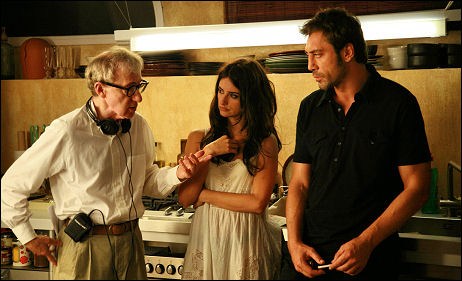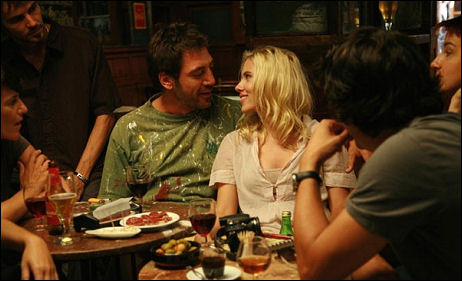Slate‘s Mickey Kaus has written very strongly and (I have to admit, distasteful as this whole mess is) persuasively about why the mainstream media should be covering the apparently for-real John Edwards paternity scandal with his alleged girlfriend Rielle Hunter.
I heard months ago through persons I trust with close-to-the-source knowledge that this story is on the level. Photos and mounting evidence are included in this week’s National Enquirer. Read Kaus and tell me he’s wrong.
Day: August 6, 2008
Clear Sailing
The Weinstein Co. has won its appeal with the MPAA ratings board over a disputed NC-17 previously given to Zack and Miri Make A Porno, resulting in an R-Rating. The less ferocious rating nonetheless stands for “crude sexual content including dialogue, graphic nudity and pervasive language.” Graphic nudity involving…? No, don’t even think it.
Pussycat Lezzies
Great — another recycled Grindhouse-style B-movie from Quentin Tarantino starring the craziest and emptiest Holllywood ding-dong of the 21st Century. Beyond help, beyond redemption and out of control, Tarantino just keeps sinking deeper and deeper into the trash pit, a little bit like that Arab kid drowning in quicksand in Lawrence of Arabia. The fact that I can’t wait to see this is immaterial.
Pickle-Lickin’ Good
No question about it — John McCain’s admission yesterday that his wife Cindy might be good enough to win the Miss Buffalo Chop contest at the Sturgis motorcycle rally (“She could be the only lady to serve as first lady and Miss Buffalo Chip!”) showed he’s either a crusty old mysogynist or clueless about the actual nature of the Miss Buffalo Chip rites (wet T-shirts, orgasm simulating, etc.).
I suspect it was a half-and-halfer. McCain probably just meant to say that Cindy’s dishy enough to compete ina biker beauty contest, but he wound saying that she might just be good enough to beat out the other biker babes at pickle licking. Here’s a Daily Kos opinion from “Eagleeye“about the MSM’s coverage of this.
My Little Girl
For those who responded the other day to that Carousel/”I Walk Alone” YouTube clip, here’s a wav file of Frank Sinatra (the first Billy Bigelow in the 20th Century Fox/Henry King film before he quit and Gordon MacRae was hired to replace him) signing Rodgers & Hammerstein’s “Soliloquy.” Sinatra was five times the singer that MacRae was — here’s proof.
More Of It
Here’s another article about the Jon Voight brouhaha, except this one — written by Politico‘s Jeffrey Ressner — has a Voight quote: “It’s out of line to insinuate that we should blacklist people for speaking their minds. It’s an important time for people on the conservative side to speak out, [but] it’s a strange thing when people in this country can’t express their opinions without being attacked.”
I agree 100% that it’s wrong to insinuate that anyone should blacklist anyone for speaking their minds. I didn’t think I did that last week by confessing that if I was a producer making a film I might not hire Voight for it. I thought I was just speaking for myself by admitting to a momentary feeling of petty vengeance. Face it — it feels good to stick to people you don’t like or disagree with, but I wouldn’t recommend or advocate hostile get-backs as a general policy.
I’ve said repeatedly that there’s a big difference between (a) saying I “might” theoretically stick it to someone I disagree with by ignoring them or not giving them a job on a movie and (b) suggesting, much less advocating, that other liberal-minded industry types act on this feeling in reality. I’ve also stated a core belief that hiring actors should always be about what’s best for the film. But none of this matters because the right-wing hammers are going to make as much hay as they can out of the portions of what you’ve said that serve their agenda, and never the all of it.
Voight also told Ressner that “I don’tt want to make a big deal out of this. I made some very strong points, and you do expect that people are going to respond to it in a variety of ways. And that’s how it should be.”
Yesterday Glenn Beck went off on yours truly a little bit on CNN last night,. The usual torrent of wingnut hate mail followed. News cycles on a particular story are pretty short these days — 48 to 72 hours — but this thing has been going since last Tuesday or Wednesday. And it’s not over yet as I’ve agreed to come on CNN this afternoon and The O’Reilly Factor tomorrow sometime. O’Reilly will try and kick the stuffing out of me, but I’ll get a readership bump out of it so why not?
Schmidt Effect
“How important is it for candidates to tell the truth?,” asks Elizabeth Kolbert in an 8.11 New Yorker essay. “Throughout his long career in politics, John McCain, who called his PAC Straight Talk America, has presented frankness as his fundamental virtue. [But] the past few weeks have seen a change in McCain. He has hired new advisers, and with them he seems to have worked out a new approach.
“He is no longer telling the sorts of hard truths that people would prefer not to confront, or even half-truths that they might find vaguely discomfiting. Instead, he’s opted out of truth altogether.
“Recent history suggests that Presidential campaigns don√¢‚Ǩ‚Ñ¢t reward integrity; the candidate who refuses to compromise his principles is unlikely to have a chance to act on them. Still, McCain’s slide is saddening. That he has sunk to the level of ‘Pump'” — the ad that more or less blamed Barack Obama for rising gas prices — “a full month before Labor Day really doesn√¢‚Ǩ‚Ñ¢t leave him — or the race — far to go.”
Added N.Y. Times columnist Maureen Dowd said in yesterday’s column that “McCain’s mouth is moving but the words coming out belong to his new hard-boiled strategist, Steve Schmidt, a Rove prot√ɬ©g√ɬ©, nicknamed ‘The Bullet’ for his bald pate. Schmidt has turned Mr. Straight Talk into Mr. Desperate Straits. It√¢‚Ǩ‚Ñ¢s not a good trade. ”
Carr Tube
Night of the Gun author and N.Y. Times guy David Carr paid a visit to MSNBC’s “Morning Joe” this morning to talk about his account of his turbulent druggy past. Asked how his confession of substance abuse in the ’80s squared with his present-tense employment with the straight-laced New York Times, Carr said his history was never “about journalistic malfeasance or professional degradation…I’m not one for missing deadlines or screwing up assignments.” Here, again, is my 7.19 piece on Carr’s book.
Self-Hypnosis
All is well in Vicky Cristina Barcelona (Weinstein Co., 8.15) when Penelope Cruz‘s neurotic firecracker is on-screen and having her way, and particularly when she’s arguing with Javier Bardem‘s compulsive seducer-slash-painter. These two provide the erotic blood-flow in this Woody Allen film, and thank the Movie Gods for that. VCB is certainly worth seeing for Cruz and Bardem alone, but if the film had been entirely about them I would have been 100% delighted.

As is, VCB is about a couple of American girls — Vicky (Rebecca Hall) and Cristina (Scarlett Johansson) — getting romantically involved with Bardem (and to a lesser extent Cruz) during a summer in Barcelona, and the hard fact is that Johansson and Hall are nowhere near as interesting as their Spanish-born costars.
And yet Vicky Cristina Barcelona played better at Monday’s night’s premiere screening in Westwood than it did for me in Cannes, and I’m trying to figure out why.
One reason had to do with mere suggestion, I suppose. The crowd at Westwood’s Village theatre laughed heartily at just about every joke and visual inference, and the press people in the Grand Palais last May were much more subdued. Another persuader was the fact that I read David Denby‘s review of Allen’s film just before the Village screening, and an observation of his had a surprising effect.
One of my beefs against Vicky Cristina Barcelona when I reviewed it on 5.16.08 was the incessant narration. I described it as “persistent, obnoxious and thoroughly unwanted” and said that it made “this story of overlapping, off-and-on love affairs in present-day Barcelona so on-the-nose and over-explained that I was feeling actively hostile less than 15 minutes in.”

Denby, however, wrote the following: “Allen uses a narrator (Christopher Evan Welch) to explain who the women are, and, at first, it seems as if the director is just filling in backstory and telling us things we might have noticed ourselves. But this narrator does for Allen what narrators once did for Francois Truffaut — he allows him to skip merely functional exposition and jump from highlight to highlight.”
Truffaut! A light went on. Or rather, I found myself gradually succumbing to a cousin of the movie lover’s “Russian Tea Room syndrome.” Legendary critic Andrew Sarris described this back in the ’80s as a willingness to not only accept but applaud speed-bumpy things in a foreign-language film (precious-sounding dialogue, say, or a clumsily-composed narrative) that an American viewer might reject outright if included in an English-language film, and especially a Hollywood-produced one.
An hour or so after finishing the Denby review (which I read while sitting at Jerry’s Deli), the lights came down at the Village and I began watching Vicky Cristina Barcelona with the idea that it was, in fact, a French-language Truffaut film, and it played like a whole different animal. Not painful, not prickly. Not first-rate but a mostly agreeable thing.
I still preferred Cruz and Bardem’s scenes to everything else, but the narration didn’t get on my nerves because it was now the narration in Truffaut’s Two English Girls or The Woman Next Door,and that was okay.

It still felt as if Allen was faintly mocking his own writing style and penchant for having his characters forever going to musuems, chatting in cafes and talking about artistic longings…aaah, I’m blathering. My basic point is that it played better the second time so do what you will. Odds are you’ll have a pretty good time with it.
Of course, if you’re under-25 you won’t go at all because GenY audiences, to go by the box-ofice track record of Allen films over the last eight or ten years, are averse to the Allen sensibility.
I want to repeat one complaint from last May, which is Allen’s no-naked-breast- shot rule. “He’s telling a story that’s swimming in mad erotic currents,” I wrote, “and yet he’s clearly decided against boob exposure — not even a casual random glimpse. It’s obviously unnatural and un-European. Presumably this was about avoiding an R rating, but the oddly prudish vibe works against the story and the general mood, so why even pick up the brush if you’re afraid to paint a nipple?”
